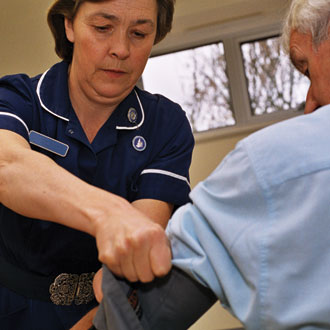Shortage of nurses and pharmacists could hinder Scottish contract roll out

Failure to plan for the numbers of new nurses, pharmacists, physiotherapists and other healthcare staff could hinder GP efforts to implement plans outlined in the new Scottish GP contract, doctors leaders have warned.
Six months after the contract came into force, proposals to redistribute some aspects of GP workload to the wider primary care multi-disciplinary team are being put in place.
But some areas are hitting problems finding enough staff – including pharmacists and physiotherapists – to fill vacancies on the teams that are being set up.
BMA Scotland GP Committee chair Dr Andrew Buist said: ‘I have been saying to the Government for some time they need to carefully look at the workforce requirements for the new groups of staff.
‘I don’t think we’re producing enough of them.
‘We could find ourselves in the situation where we have more money but not enough people to do the job.’
Under the new contract, which came into force in April, several services – including vaccination and pharmacotherapy – will be provided by health boards by 2021 without loss of income to general practice.
Health and social care partnerships have been tasked with working out how these services, which will also encompass community treatment and care services, acute musculoskeletal physiotherapy services, community mental health services and community link worker services, will work in their area.
Dr Buist has also raised concerns that some health and social care partnerships have couched their plans in negative language around their ability to get teams in place in time.
He has asked Scottish health minister Jeane Freeman to address this in her speech to the annual LMCs conference tomorrow.
‘I asked her to be quite blunt that there is an absolute expectation that these services will be delivered by 2021. We cannot plan at this stage for failure. They have to say, this is what we will need, this is what we think it will cost.’
It is a topic set to be debated at the conference with Glasgow LMC putting forward a motion which raises concerns about recruitment and workforce planning and calls on the Scottish Government to ‘urgently increase the number of training posts’ for pharmacists, physiotherapists, nurses and independent prescribers
Dr Drummond Begg, chair of Lothian LMC, said while plans were being put in place for multi-disciplinary teams HSCPs may find it hard to recruit enough staff to fill the additional roles in general practice.
‘You reap what you sow. These are the consequences of decisions made five to ten years ago.’
Dr Andrew Thomson, joint medical secretary of Tayside LMC agreed that recruitment will be a challenge.
‘There are limited numbers of staff available, especially pharmacists.’
Pulse July survey
Take our July 2025 survey to potentially win £1.000 worth of tokens











